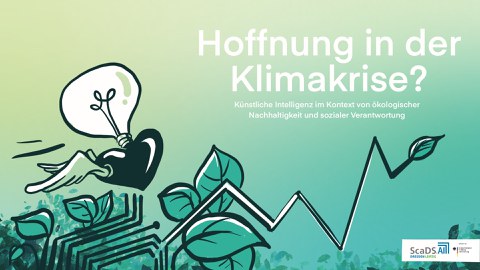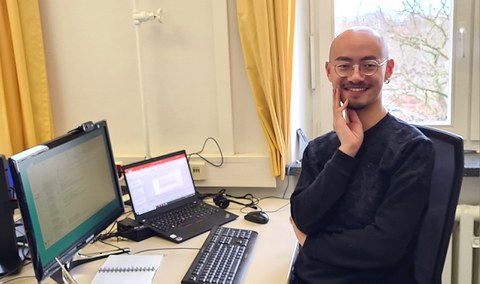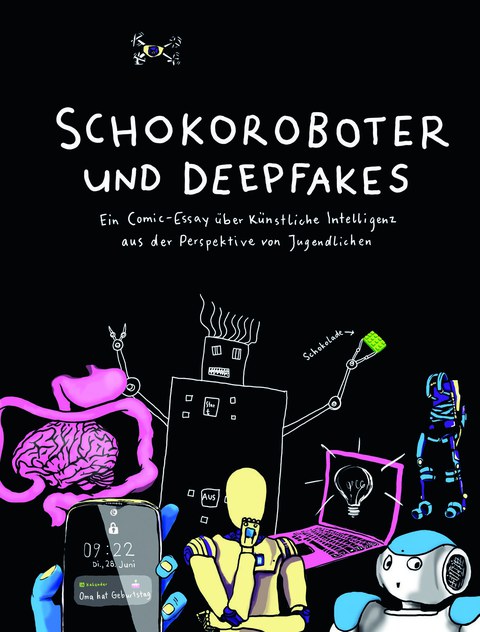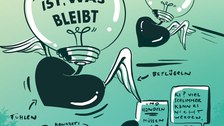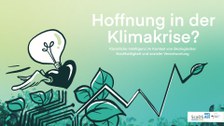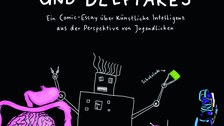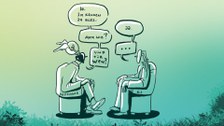Pillars & Umbrellas
Table of contents
Pillars endure. Until the next paradigm. Umbrellas offer protection. But the storm bends them and they are quickly forgotten. Both symbolize democracy as a prerequisite for the success of gender equality and the appreciation of different realities of life. The Pillars & Umbrellas event series (with the formats Dialogue, Hands-On, Visual Takes) reflects the core topics of gender equality, participatory justice, sustainability and cultural diversity in various formats.
Pillars & Umbrellas is a project by ScaDS.AI Dresden/Leipzig in cooperation with the Officer for the Protection of Women's Rights and Equal Opportunities at TU Dresden.
The Pillars & Umbrellas event series creates a participatory and inclusive platform that addresses the impact of artificial intelligence on our society. Through versatile and connectable formats, the dialog between developers and users is intensified with the aim of reflecting on artificial intelligence as a citizen science.
CURRENT EVENTS
February 11, 2026; 12.00 p.m. – 03.30 p.m.
Hands On Workshop Magic Mirror – Generative Bild-KI, Körperbilder und Macht
International Day of Women and Girls in Science, Universität Leipzig: Hands-On Workshop as part of the action day „Women in Science 2026 – Alliances for Change”
Cooperation Vanessa Kuhfs und Team CitizenScience.AI, ScaDS.AI Desden/Leipzig
Embodied science communication between feminist HCI and media education
Project: "Who designs for whom in AI?" What AI has in common with power, feminism and a (distorted) mirror.
Generative image AI often appears to be an objective tool - but behind the images lie social norms, prejudices and reproduced power structures. With the interactive AI project “Magic Mirror”, we want to make this dynamic tangible and open to discussion: participants recognise in their owen ‘mirror image’ how AI makes decisions, what attributions arise and how fairness is negotiated.
We invite you to join us in taking a critical look at the topic of ‘Generative Image AI, Body Images and Power’ and to contribute your personal experiences. An interactive mirror installation, the 'Magic Mirror' makes AI pipeline steps visible, algorithmic decisions comprehensible and problematic outputs discussable. Through practical exercises on prompt sharpening and targeted perspective shifting, you will learn how attributions arise, how to critically address them, and how to strengthen AI literacy in a targeted manner. Feminist perspectives and moderation ensure that all experiences are reflected upon respectfully and safely. The aim is to promote and discuss responsibility, judgement, and the ability to act when dealing with generative AI.
Date/Time: 11/02/2026, 12:00 PM –to 03:30 PM
Type: Workshop/Seminar, Presence
Location: Foyer des Augusteums
Event series: "Action Day" Women in Science 2026 – Alliances for Change
PREVIOUS EVENTS
Film title: Donna Haraway: Story Telling for Earthly Survival
Venue: Kino im Kasten, English with German subtitles (OmeU)
Date: Wednesday, November 5, 2025
Start: 8:00 p.m.
The scholar and feminist thinker Donna Haraway is perhaps best known as the author of two groundbreaking works: the essay “A Cyborg Manifesto” and the book “Primate Visions”. In both works, Haraway turns established “universal” categories—such as gender essentialism—upside down. She dissolves the boundaries between humans, animals, and machines, and questions humanity’s fascination with primates from a postcolonial perspective.
Story Telling for Earthly Survival is a cinematic portrait that presents Donna Haraway as a vibrant and charismatic thinker whose complex ideas about the environmental crisis and human–nature relations are deeply inspiring. Haraway advocates a holistic worldview and emphasizes the necessity of “making kin”—that is, creating responsible and interconnected relationships among humans and the more-than-human world. She critiques the term “Anthropocene” as too imprecise and instead introduces the concept of the “Plantationocene” to highlight the historical, political, and economic roots of the ecological crisis. The film conveys Haraway’s call to resist both pessimism and blind technological optimism, urging us instead to stay with the “trouble” of our times—actively and compassionately. In doing so, the film renders her complex theories tangible and accessible, inviting viewers to reflect on new forms of coexistence.
We are delighted to welcome Felix Grewe to this event. In his talk and the subsequent discussion, he will explore the fascinating, poetic, and powerful constructions and concepts of Donna Haraway. His contribution will go beyond a purely thematic analysis, opening a critical space for reflection in which the ethical, political, and epistemological dimensions of technology and the future can be discussed within their social context.
Grewe is a research associate at the University of Paderborn and is pursuing a PhD on Donna Haraway’s theory, with a particular focus on redefining the boundaries between gender, body, and technology. His research lies at the intersection of media studies, feminist theory, and technology studies.
In October/November and December 2022, one film was shown in each month at the "Kino im Kasten" in Dresden.
- Documentary film "The dilemma with social media"
The first evening takes a look at America, where social media platform operators are essentially driving the development and financing of AI. A feature-length documentary focuses on the potential risks of social media, particularly for our mental health. Media culture scholar André Wendler joins us for a discussion in the supporting program. - Documentary "Coded Bias" (with Josephine D'Ippolito)
The second documentary "CODED BIAS" (USA 2020) addresses the desire for inclusive facial recognition software through the fresh lens of a digital activist. Numerous examples are used to show how AI algorithms reproduce racist and gender-specific prejudices. One area of application is video surveillance, which is ubiquitous in China and is also used in Germany, for example at train stations, airports and border controls. The evening's speaker is Josephine D'Ippolito, who is concerned with the reflection of gender and AI in the medium of film. - Feature film "HER" (moderated by the project team)
The protagonist of the science fiction film drama shown in December writes empathetic letters for people who have difficulty revealing their feelings to their counterparts. What does a person need to develop feelings? After the break-up of his long-term relationship, he falls in love with the voice of his newly installed operating system, which is based on artificial intelligence. To what extent is such love possible?
After the lively discussions in the previous colloquia, we look forward to continuing this journey together with you and Dr Sandra Buchmüller, visiting scholar for feminist technology research at TU Dresden. As part of the event series, current works from the fields of feminist science and technology studies, critical design research and gender and queer studies will be read and discussed. Special attention will again be devoted to a selection of fundamental works that have shaped discussions and changed perspectives in the past.
January 22, 2026; 10.00 a.m. – 11.30 a.m.
Tanja Kubes, A Critique of Human-Centred AI: A Plea for a Feminist AI Framework (FAIF) in AI & Soc (2025)
The much-debated article by Tanja Kubes, which was published in offers a critical perspective on Human-Centred AI (HCAI) as it is currently practiced. According to her argument, HCAI remains largely Eurocentric, androcentric, and anthropocentric. It is driven by capitalist market logic with no commitment to sustainability. HCAI disregards and exacerbates global injustices and ecological impacts.
Taking an anthropological approach, the article offers a feminist, post-humanist and neo-materialist perspective on HCAI. It proposes a Feminist AI Framework (FAIF) which incorporates findings from more-than-human anthropology and body phenomenology. These concepts are inspiringly connected with Donna Haraway's theory. The proposed FAIF concept aims to reassess the relationship between humans, other life forms and technology. It explores the potential for collaborative, non-hierarchical AI design, usage and control. Rather than focusing primarily on damage control, FAIF is a proactive attempt to ensure the co-constitutive well-being of humans and non-humans. It does so by challenging traditional narratives about AI and progress.
As a background reading we recommend the article from Tanja Kubes and Thomas Reinhardt “Techno-species in the Becoming Towards a Relational Ontology of Multi-species Assemblages (ROMA)” in Nanoethics 16, 95–105 (2022)
Friday, 12 December 2025, 2.50 p.m. – 4.20 p.m.
Ana Valdivia, Data Ecofeminism in FAccT ’25: Proceedings of the 2025 ACM Conference on Fairness, Accountability and Transparency
In this paper, Ana Valdivia proposes a critical rethinking of GenAI’s proliferation through an ecofeminist framing. Historically, this framinghas interrogated the role of science and technology in the context of gender and environmental justice. The paper therefore introduces seven data ecofeminist principles delineating a pathway for developing technological and just transition alternatives within the AI research context. Valdivia emphasizes a critical examination of this technology’s role, while taking into account the current socio-ecological challenges. The paper calls for an urgent reassessment of the GenAI innovation race. In particular Valdivia is strongly advocating for ecological and feminist technological projects that make the planet, people, and life a priority.
We recommend Charlotte Kerner’s “We are Volcanoes” as background reading. The book provides insights into the beginnings of the ecofeminist movement. It is portraying the writer Rachel Carson, the researcher Lynn Margulis, and the philosopher Donna Haraway.
As in the previous year, we want to do justice to the pre-Christmas spirit. We cordially invite all participants to bring cookies or other small treats. Make sure to join us afterwards for a visit to a Dresden Christmas market!
Wednesday, 14 May 2025, 11:10 - 12:40 a.m.
Donna Haraway, ‘Modest_Witness@Second_Millennium. FemaleMan_Meets_OncoMouse Feminism and Technoscience’; Donna J. Haraway, Thyrza Goodeve, Routledge; 2. Edition (2018)
The detailed overview lecture on Haraway's life and work given by the speaker Felix Grewe at the last colloquium left many questions open. We are therefore delighted to have him on board to continue our exciting discussion. All interested parties are cordially invited to attend, including those who were not present in March.
In order to find a good starting point for the discussion and to pick up where we left off, we will read Modest_Witness@Second_Millennium FemaleMan_Meets_OncoMouse Feminism and Technoscience; by Donna J. Haraway and Thyrza Goodeve together for this meeting, in particular the introduction and the first chapter. The book is available in the university library. A copy can also be borrowed from us on request. We highly recommend reading ‘The Promises of Monsters: A Regenerative Politics for Inappropriate/d Others’ from the anthology ‘Cybersexualities: A Reader in Feminist Theory, Cyborgs and Cyberspace’.
Monday, 3 March 2025, 4.40 - 6.10 p.m.
Donna Haraway, ‘Cyborgs to Companion Species: Reconfiguring Kinship in Technoscience’ published in ‘The Haraway Reader’, New York, NY [et al:] Routledge, 2004
We are looking forward to an especially exciting input lecture by Felix Grewe.
Felix Grewe is a research assistant at the Institute for Human Sciences - Philosophy in the research areas of Professor Ruth E. Hagengruber: Centre for the History of Women Philosophers and Scientists EcoTechGender. The working title of his dissertation is ‘Donna Haraway: On the re-definition of boundaries of sex, gender and biomechanical species’. During the event, he will give an insight into his research and discuss it with us.
The text for this week is Donna Haraway's ‘Cyborgs to Companion Species: Reconfiguring Kinship in Technoscience’, available in the university library. A copy of the reader can be borrowed from us on request. For more in-depth study of the topic, we recommend ‘Donna Haraway: Technoscience, New World Order and Trickster Stories for Living Worlds’ by Jutta Weber from the book ‘Schlüsselwerke der Science & Technology Studies’.
We see the colloquium as an open reading and discussion format in which everyone can participate in terms of time, place and content as they see fit. We expressly welcome suggestions for articles and authors. The events will be held in German until further notice. If you wish to discuss certain topics or texts in English, please contact us in person or by e-mail.
Location: Room 118, Merkelbau, Helmholtzstrasse 14, Campus TU Dresden or Online via Zoom
Please register to: . We will gladly provide you with the link to the digital room.
Wednesday, 18.12.2024, 2:50 – 4:20 pm.:
Michael Klipphahn-Karge, Ann-Kathrin Koster and Sara Morais dos Santos Bruss; Foreword and introduction, Ute Kalender; Queer-crip Perspektiven auf die Cyborg-Figur im Kontext von Künstlicher Intelligenz in Queere KI. Zum Coming-out smarter Maschinen, edited by Michael Klipphahn-Karge, Ann-Kathrin Koster, Sara Morais dos Santos Bruss.
To conclude our colloquium for this year, we read from the publication on the symposium of Schaufler Kolleg@TU Dresden & GenderConceptGroup in June 2021 the introduction and the contribution by Ute Kalender from Chapter II. Somatik. As background reading, we recommend Tanja Kubes (2020); Queere Sexroboter - Eine neue Form des Begehrens? Everyone is cordially invited to share their favourite chocolate with us for a joint discussion to celebrate the end of the year. Afterwards, we will be happy to take participants in attendance on an excursion into the culinary delights of Dresden's pre-Christmas season.
Monday, 28.10.2024, 13:00 to 14:30
Milagros Miceli, Martin Schuessler, Tianling Yang (2020); Between Subjectivity and Imposition: Power Dynamics in Data Annotation for Computer Vision
In the context of past meetings and discussions, the participants of our colloquium requested a discussion on the topic of clickworkers. The renowned researcher Milagros Miceli is a recognized expert in this field. She is head of the "Data, Algorithmic Systems and Ethics" research group at the Weizenbaum Institute and an associate researcher at the DAIR Institute. As a sociologist and computer scientist, she investigates the ethical and social implications of the development of artificial intelligence, especially data work. She studies the production of ground truth data for machine learning with a particular focus on working conditions and power relations. For an interesting insight into the author's thought processes, we recommend the interview with her in the great podcast "Purple Code - Intersectional feminist perspectives on digital societies".
Monday, 21.10.2024, 14:50 to 16:20
Susanne Witzgall; Sympoietic Design as an Ethical Project in Perraudin, L., Winkler, C., Mareis, C., Held, M. (Eds. 2023); Material Trajectories: Designing with Care
The reading of the reader "Material Trajectories: Designing with Care" is to be continued. At the last meeting, the foreword and an article from the chapter "Positioning Care" were first discussed. The focus of this meeting is now on the article "Sympoietic Design as an Ethical Project" by Susanne Witzgall from the chapter "Sympoietic Futures". Previous readings have led to much discussion about the claim to objectivity of science and the demarcation between the natural sciences, humanities and cultural studies. In this context, we recommend examining Karen Barad's concept of"Agential Realism", for example in Sigrid Schmitz; Karen Barad: Agentieller Realismus als Rahmenwerk für die Science & Technology Studies.
Monday, 12.08.2024, 13:00 to 14:30
Perraudin, L., Winkler, C., Mareis, C., Held, M. (Eds. 2023), Material Trajectories: Designing with CareReading Anna Crohn's article, which provides an overview of relevant feminist approaches to digital technology design that, in our view, is very abstract and thus not very application-oriented, has left us with gaps in our understanding of the concepts mentioned and with the question of what exactly is meant by human-computer interaction. This meeting will therefore focus on the practical application of the various concepts from feminist research in the field of human-computer interaction. To this end, we would like to draw on our own experiences and on the following texts: From the publication "Material Trajectories: Designing with Care", the introductory chapters (p. 9 to p. 32) will be discussed and, as an add-on, Joanna Boehnert: "Design Politics in the Anthropocene", pp. 75 to 88. This anthology is the result of the 2021 annual conference of the German Society for Design Theory and Research (DGTF) in cooperation with the Cluster of Excellence "Matters of Activity. Image Space Material" of the Humboldt-Universität zu Berlin and the weißensee kunsthochschule berlin. We also recommend the following texts by John M. Carroll and Zuhan Pan as background information.
Further suggestions are expressly desired
Monday, 05.08.2024, 13:00 to 14:30
Anna Croon (2022), Thinking with care in human-computer interaction
Anna Croon is Associate Professor at the Faculty of Computer Science at Umeå University in Sweden. She is head of the research group Feminist Technoscience, which develops critical perspectives on everyday digital practices based on design-oriented and feminist theories.
Her article Thinking with care in human-computer interaction examines human-computer interaction as a design-oriented practice. By looking at feminist accounts of situated knowledge and touching visions, it argues that feminist thinking is well on its way to offering real alternatives of great significance for human-computer interaction.
The analog venue on the main campus of TU Dresden is:
Merkel Building, Helmholtzstraße 14, Room 118, First Floor
As in previous meetings, we see the colloquium as an open reading and discussion format in which everyone can participate in terms of time, place and content as they see fit. The submission of text suggestions is expressly encouraged.
The events will be held in German until further notice. If you wish to discuss certain topics or texts in English, please contact us in person or by e-mail. When registering at , please indicate whether you would like to participate digitally or in person. We will send you the link to the virtual seminar room.
After the great success of Meet Feminist Tech -Diversifying Insights in Data and AI, the CitizenScience.AI project at ScaDS.AI Dresden/Leipzig invites you to the second part of our colloquium in the summer semester 2024. Three new dates are available to read and discuss current texts on the topics of Critical Decoding of AI and Socially Just and Sustainable AI together with Dr. Sandra Buchmüller, guest researcher for feminist technology research:
Monday, May 27, 2024, 2:50 - 4:20 p.m.
For the last session of the second part of our colloquium, we will deal with a method from use-centered design for the classification and representation of user groups: Personas. On the one hand, we will discuss the text "Stereotypes and Politics: Reflections on Personas" by Nicola Marsden and Maren Haag, which focuses on the production of personas per se. Complementing and comparing this, we deal with "Action or person?
Gender-reflective design of software" by Tanja Paulitz and Bianca Prietl, which examines this method as a component of scenario-based design with regard to its contribution to gender-reflective design. We thus follow on from the discussions of the previous colloquia on mechanisms of inclusion and exclusion of classifications, the power of definition and arbitrary classification using the example of apartheid in South Africa, which were addressed in the text by Geoffrey Bowker and Susan Leigh-Star, as well as the examination of the fundamental question of the extent to which classification systems can represent real phenomena.
Monday, 13.05.2024, 13:00 - 14:30
Geoffrey C. Bowker, Susan Leigh Star; Sorting Things Out: Classification and Its Consequences (1999, Chapter 6)
For our second meeting in May, we read the essay "The Case of Race Classification and Reclassification under Apartheid" from the book Sorting Things Out: Classification and Its Consequences by Geoffrey C. Bowker and Susan Leigh Star.
In our discussion at the beginning of May, we were particularly concerned with the examination of identity construction. Kevin Guyan states in the introduction to his book Queer Data: "However, there exists a long history of political and social struggles over the design of classification systems that present themselves as 'purely technical' but promote a biased account of the social world." He backs up this statement with a reference to Susan Leigh Star, which motivated us to turn to this fascinating author. For further reading, we recommend Susan Leigh Star: Boundary objects and media research
Thursday, the 02.05.2024, 13:00 - 14:30
Kevin Guyan (2022), Queer Data, Introduction and Part I
Kevin Guyan is Chancellor's Fellow at the University of Edinburgh Business School. His work explores the intersection of data and identity. For a first impression, we recommend the following exciting discussion, which was recorded as part of Computers, Privacy & Data Protection 2022.
General:
Please contact pandu@tu-dresden.de if you do not have your own copy of the book in question.
Analog venue on the main campus of TU Dresden: Merkel-Bau, Helmholtzstraße 14, room 118, first floor
As in previous meetings, we see the colloquium as an open reading and discussion format in which everyone can participate in terms of time, location and content as they see fit. The submission of text suggestions is expressly encouraged.
The events will be held in German until further notice. If you wish to discuss certain topics or texts in English, please contact us in person or by e-mail.
Please register, stating whether you wish to participate in analog or digital form, to: . We will be happy to provide you with the link to the digital room.
Review of past colloquia and substantive discussions:
The topic of our first discussion this year was the Osnabrück University Speech 2022 by Prof. Dr. Rainer Mühlhoff. It is available as an open access publication from Universitätsverlag Osnabrück and as a recording on YouTube:
Prof. Dr. Rainer Mühlhoff already got us discussing at the final meeting of the Schaufler Lab@TU Dresden with his talk on Predictive Privacy.
At our second meeting, we discussed Donna Haraway's Cyborg Manifesto. Based on a recent interview in Philosophie Magazin (No. 74 February/March 2024), in which she places the article and the figure of the cyborg in the larger context of her thinking and work, we were particularly interested in the question of why this article from 1985 to the present day provides an occasion and starting point for current projections, discussions and inspirations.
Under the direction of Dr. Sandra Buchmüller, visiting professor at the Faculty of Mechanical Science and Engineering at TU Dresden, the CitizenScience.AI project at ScaDS.AI Dresden/Leipzig invited to a colloquium in the winter semester 2023/2024.
The event is an open reading and discussion format in which everyone could participate in terms of time, location and content.
On three dates, current texts on the topics of feminist tech, data and AI were read and discussed together:
- Thursday, 30.11.2023, 13:00 - 14:30
Sophie Toupin - Shaping feminist artificial intelligence - Monday, 15.01.2024, 16:00 - 17:30
Kate Crawford (2021): Atlas of AI. Power, Politics and the Planetary Costs of Artificial Intelligence
- Tuesday, 23.01.2024, 14:50 - 16:20
Kate Crawford (2021): Atlas of AI, especially the chapter Conclusion.Power
(Please contact if you do not have your own copy)
Between AI, Data and Digital Labor
Date: Wednesday, October 29, 2025, Inlet 6:15 p.m., Start 6:30 p.m.
Venue: Zentralkino Dresden, Kraftwerk Mitte
Artificial intelligence can be understood as a toolbox of different technologies that are linked to far-reaching processes of social transformation. The term also functions as a projection surface for technological, social, and economic hopes—ranging from quasi-religious promises of salvation to the transhumanist utopia that humanity, through science and technology, could transcend its biological limits. In this vision of redemption, there is a dystopian moment in which a machine—most vividly embodied in the image of the Terminator—threatens to bring about the end of the world. We also learn from this that it is a mistake to anthropomorphize AI, that is, to approach it as if it were human. In reality, AI processes data, recognizes patterns, and is by no means a moral actor. What easily fades into the background and risks being forgotten: artificial intelligence is the product of extensive human labor—often invisible, often exploited.
To do justice to this reality, Rainer Mühlhoff argues for a changed understanding of artificial intelligence. Instead of conceiving AI as an embodied entity or a mere vision of the future, its present and complex entanglement with human labor and social organization—beyond classical human-machine interactions—must be made visible. He therefore proposes to think of AI as “Human-Aided AI,” that is, as a networked human-machine system that neither exists nor functions without human involvement. (Mühlhoff, 2023, Die Macht der Daten)
Especially in the context of AI systems such as large language models, it becomes evident that technological processes are deeply embedded in social power relations. In their article Between Subjectivity and Imposition: Power Dynamics in Data Annotation for Computer Vision, Miceli, Schuessler, and Yang emphasize that the assignment of meaning to data is often portrayed as a purely technical task. Yet the systematic categorization of relevant information in datasets is not a neutral technical procedure, but an act of assigning meaning. In fact, it constitutes a powerful act with far-reaching effects on individuals and society. (Miceli, Schuessler & Yang, 2022, Between Subjectivity and Imposition) The Taylorist notion that intellectually demanding tasks in AI development can be separated from simple, fragmented work optimized through processes thus proves to be untenable.
The overarching concept of platform labor encompasses those services in the AI sector that are mediated or provided via web-based platforms. Various forms can be distinguished, such as click work, microwork, data work, or ghost work, although their boundaries are fluid and must be redefined depending on the context. These terms also point to precarious working conditions, the absence of rights, and the often invisible dimension of human labor that makes digital systems such as AI possible in the first place. Platform labor is, on a global scale, part of a neoliberal economy in which work is rendered insecure, de-bordered, and flexibilized.
The focus of our evening will therefore lie both on making visible and acknowledging the human component in “Human-Aided AIs,” as well as on the working and living realities of digital laborers.
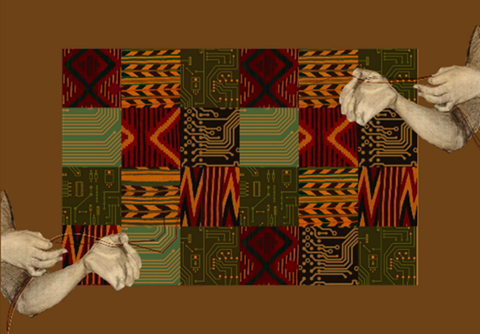
Figure 1 Hanna Barakat & Archival Images of AI + AIxDESIGN
Schedule, Speakers & Inputs
The event The Invisible Faces of AI: Ghost Workers, Click Labor and Digital Exploitation offers the opportunity to jointly explore various aspects of this complex field of tension. To enable diverse perspectives on the topic, we have invited people who engage with it from different professional, political, and artistic angles. The ceremonial opening of our event on the topic of click working will be introduced by Birte Platow with a welcome address.
Birte Platow
Birte Platow holds the Chair of Religious Education (Protestant) at Dresden University of Technology, is a member of the Board of the Center for Scalable Data Analytics and Artificial Intelligence, and serves as Area Lead of its research division of Responsible AI. With her research on theology and artificial intelligence as well as on the ethics of technology, she brings an interdisciplinary perspective to the discussion on digital forms of labor and the associated ethical challenges. Her focus on the future of education and ethical education highlights the necessity of developing new competencies and values in dealing with AI and digital work. In addition, her research contributes to fostering respectful dialogue across diverse working contexts.
Lisette Olsthoorn
To begin, we will watch the approximately 20-minute film Ghost Workers by Lisette Olsthoorn. Ghost Workers is a cinematic research project created in collaboration with Prof. Claartje ter Hoeven. The film sheds light on the often hidden human labor that is essential for artificial intelligence to function at all. Afterwards, the filmmaker herself will provide us with insights behind the scenes of her work. Lisette Olsthoorn practices what is known as cinematic research, a hybrid form combining film and innovative scholarship. As the director and creator of Ghost Workers, she powerfully brings this subject to the screen. Her current project, UBER: THE CONVERSATION, is an experimental documentary that explores the working conditions of Uber drivers through reenactments and collaborative working methods.
We are also very pleased that Tanja Carstensen and Adio Dinika will first share their perspectives and contributions on the topic. Following this, we will open the floor for a joint discussion with the audience.
Tanja Carstensen
Tanja Carstensen holds the Chair of the Professorship of Sociology with Focus on Work, Economy, and Organization at Chemnitz University of Technology. Her research areas include gender, diversity and intersectionality in the context of digitalization, the transformation of work, and technology discourses. As a sociologist, she investigates the interrelations between digitalization and labor, particularly the effects of digital technologies on working conditions and the often-invisible people behind AI systems. A key area of her work is click work and platform labor.
Adio Dinika
Adio Dinika is a political scientist, author, and co-founder of the community-based research project Data Workers’ Inquiry, in which data workers organize as community researchers to initiate their own investigations into their workplaces (DAIR, 2022). The project builds on traditions of participatory research (Stoeker, 2013; Jason & Glenwick, 2016), enabling data workers to shape research questions and directions according to their needs and with the goal of building power in the workplace. Dinika specializes in the political economy of AI labor, with a focus on the Global South. His research explores invisible AI work – such as data annotation, content moderation, and algorithmic management – as well as the power dynamics behind digital transformation. Based on interviews with 55 platform workers in transport, domestic work, IT, and creative industries in Rwanda, Zimbabwe, and South Africa, he has developed an empirical typology of the diverse experiences of these workers.
The evening will be moderated by Vanessa Kuhfs, who contributes both artistic and academic perspectives in her work at ScaDS.AI Dresden/Leipzig. She has long been engaged with the topic of click working and has helped shape this event through numerous conversations, discussions, and reflections.
What is it all about? The climate crisis is here and is already exacerbating economic and social inequalities on a global scale. Sustainable concepts for countermeasures therefore reflect the most diverse scenarios and interactions and discuss the moment of responsibility of the individual and society, also in science, against the background of diverse value structures. Artificial intelligence can support problem-solving that meets current challenges in a transdisciplinary and networked way.
These and other theses were discussed together with exciting guests on 10.11.2023. The welcome address was given by Dr. Andrea Blumtritt, State Commissioner for Anti-Discrimination. There were exciting inputs from:
Prof. Dr. Carmen Leicht-Scholten, RWTH Aachen,
Video contribution to the symposium
Dr. Sandra Buchmüller, TU Dresden
Sustainability needs diversity. The importance of gender and diversity aspects for socially just technology development
Prof. Dr. Stefan Gumhold, TU Dresden/ScaDS.AI
Artificial intelligence in the climate crisis
and the TU Environmental Initiative - tuuwi
The students' perspective
The program was accompanied by Dr. Göde Both, Scientific Advisor, DZHW Berlin
(Gender MINT digital) and Henrike Terheyden (artist from Dresden - Graphic Recording).
On June 19, 2025, another online lecture focusing on India took place as part of the series “Pillars & Umbrellas - Breaching the Borders in the Era of AI.”
The series is dedicated to international exchange on the societal and ethical challenges of technological transformation—particularly in the context of artificial intelligence. Its aim is to make global perspectives visible and to critically examine fundamental questions about the future.
Speaker Jyotika Dalal provided interactive insights into an India beyond Western-dominated narratives: a country shaped by cultural diversity and a dynamic wave of digitalization. Through concrete case studies, she illustrated how AI-powered technologies are already being applied across various sectors—from industry and agriculture to research—and discussed their potential for process optimization. At the same time, she addressed the downside of these developments: social inequality, limited access, and structural disparities emerging in the wake of digital transformation.
In the concluding discussion, the complex interplay between technological innovation and social responsibility was further explored and critically reflected upon together with the audience.
As part of our event series Pillars & Umbrellas - Breaching the Borders in the Era of AI, we organized an online event on Japan and Taiwan on 15th and 18th November. The aim of the event series is to promote international and intercultural dialog on the ethical and social impacts of technological progress, particularly in the field of artificial intelligence, and to stimulate discussion.
At the event on Japan, Karsten Michalke and Xiangguo Wang gave a comprehensive presentation on the Japanese approach to AI. They highlighted key challenges such as demographic change and urbanization and presented the national strategy "Society 5.0", which uses technological innovations to solve social problems. They explained Japan's approach to AI regulation, which is based on the principle of "agile governance" and emphasizes flexible, risk-oriented measures. Particular attention was paid to the use of new technologies in education, such as those promoted by the "GIGA School" program. Japan is also seriously addressing the challenge of promoting equality, diversity and sustainability, setting an example for a more inclusive and future-oriented society.
At the event on Taiwan, Prof. Jih-Hsuan Lin presented the Taiwanese government's strategies based on democratic values. She addressed both top-down processes in policy-making and extended participatory social debates, which are promoted by AI-supported platforms such as Pol.is and whose consensus can then be incorporated into political processes. Using illustrative examples, Prof. Lin showed how immersive AI technologies are increasingly being used in a variety of everyday scenarios, particularly in education. Prof. Tzong-Han Tsai, leading researcher of the TAIDE project (Trustworthy AI Dialogue Engine), highlighted the ethical significance of fake and fact-checking in LLMs (Large Language Models) and presented methodological approaches to problem-solving in this area.
Both events ended with a round of discussion in which participants explored both technical and ethical issues in a global context.
On Thursday, March 2, 2023, the online lecture on "Breaching the borders with and in AI - China as a scientific cooperation partner from a cultural perspective" took place as part of the Pillars & Umbrellas event series.
The lecture was given by Chi Ziesmann, who works as a project coordinator in our office after completing his technical and intercultural studies. He spoke about the impact of technological advances on different levels of society in the People's Republic, including politics, ethics, gender equality and cultural diversity. He explained how to understand the Chinese mentality towards modernization and digitalization and how it differs from the European one.
This was followed by a lively discussion in which various topics were addressed. Dr. Birgit Häse, Director of the Center for East-Asia Studies at TU Dresden, took up the topic of data protection and national security in China and expressed her well-founded opinion on the subject. International cooperation with the People's Republic of China in the field of AI research is challenging, but there are also promising opportunities.
Dr. Jutta Luise Eckhardt Head of the Office for the Protection of Women's Rights and Equal Opportunities at TUD Dresden University of Technology, hosted the successful virtual evening.
The hybrid workshop Collecting Data as Counterpractice took place on September 27, 2024 as part of our Pillars & Umbrellas event series.
Led by artists Ren Loren Britton and Iz Paehr from MELT , the event provided a valuable opportunity to reflect on and critically examine existing data concepts and practices. The workshop was embedded in a line of research by the artist duo entitled Counting Feelings. This is about the individual discovery of forgotten and current experiences, desires and questions about data as part of the reality of our lives with the aim of jointly developing data practices that are sensitive to discrimination. The participants worked loudly and quietly, with modeling clay, pen and paper and an open exchange in a safe space with a deliberately limited number of participants. This also encouraged a more intensive discussion of ethical issues surrounding data collection and use.
In the afternoon, we parted with a big thank you to Ren&Iz, a strengthened sense of self-efficacy in a digitalized world and a sharpened awareness of the societal responsibility that the handling of data demands of us all.
The exhibition "Schokoroboter und Deepfakes" was on display from June 26 to July 14, 2023 in various rooms of the Faculty of Computer Science in the Andreas-Pfitzmann-Bau at TU Dresden.
During the exhibition, a workshop led by the Chair of Didactics of Computer Science for ScaDS.AI took place. Further workshops are planned. The aim is to continue the dialog started in Tübingen together with the students. Computer science workshops already take place regularly in the EduInf student laboratory at TU Dresden.
Other experts from the Responsible AI research area at ScaDS.AI Dresden/Leipzig are involved in the implementation, partly in collaboration with the Dresden artist Nazanin Zandi.
Everyone is talking about artificial intelligence: how it is changing our everyday lives, but also how it will fundamentally influence our lives in the future. But what do young people think about AI - the generation whose future everyday life will be most strongly influenced by AI? What problems do they think should be solved with AI? What should researchers be campaigning for? What fears do they have - and what are their needs? And what image do they associate with AI?
The Tübingen AI Center's outreach team asked itself these questions and passed them on to around 200 students aged 11 to 19: in the form of an online survey in which Tübingen machine learning researchers also participated - sometimes relating to their specific field of research, sometimes application-related, ethical or philosophical.
In addition, the team visited comprehensive schools and secondary schools in Tübingen and Grimma in spring 2022 to get into conversation and collect stories. In most cases, the topic of AI was initially discussed in general terms: from "Alexa" to "social media". However, the discussions quickly became more complex. Fears of the future, wars and social values were discussed.
Berlin-based comic essayist Julia Schneider translated the results into pointed comic texts. Kristina Laube, a trained journalist and science communicator at the Tübingen AI Center, supplemented these with compact scientific texts on the topics that emerged from her conversations with the young people. The result is a content-rich comic that owes its expressive neon-colored visual language to illustrator Nele Konopka - a comic for young people, adults and researchers, a comic as a testimony to the times, a comic that invites you to take part in the debate, to be curious and to engage with AI yourself. You can read the full press release on the official website of Schokoroboter and Deepfakes.
All events are part of the CitizenScience.AI pilot project.
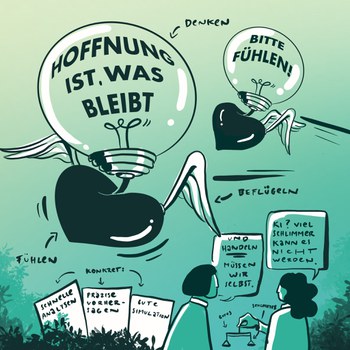
© Henrike Terheyden

© Crispin-Iven Mokry
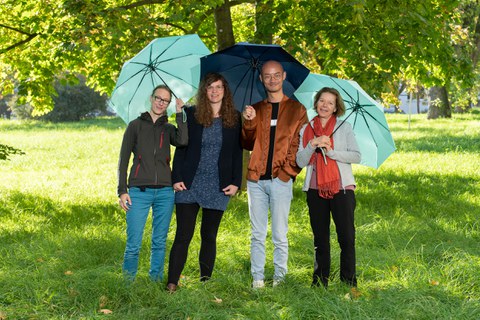
© Michael Kretschmar
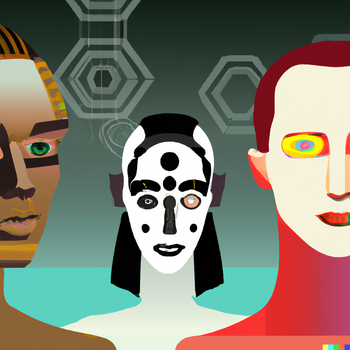
© BGFB/assistance of DALL·E 2
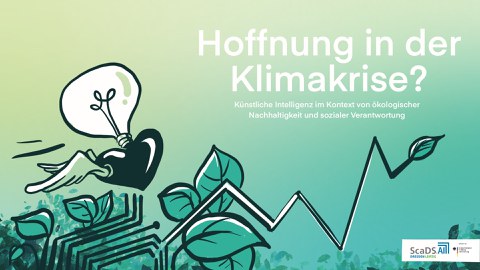
© Henrike Terheyden

© BGFB/assistance of DALL·E 2
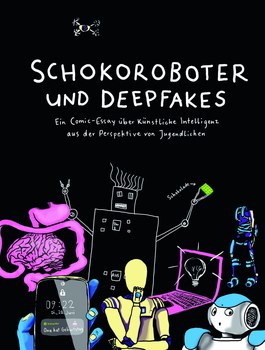
© Nele Konopka/Tübingen AI Center
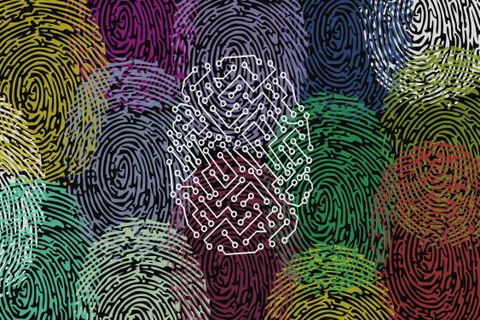
© Crispin-Iven Mokry
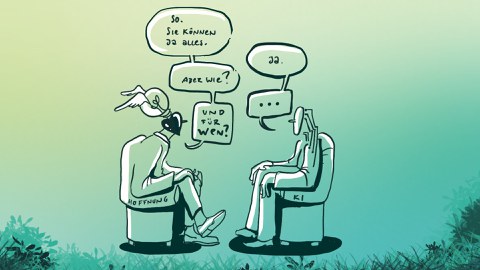
© Henrike Terheyden
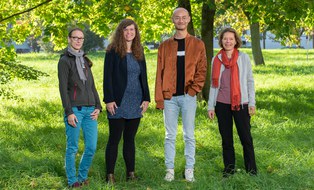 © Michael Kretschmar
© Michael Kretschmar
Project Team CitizenScience.AI
Send encrypted email via the SecureMail portal (for TUD external users only).
This project is funded by the Federal Ministry of Education and Research (BMBF) and the Free State of Saxony as part of the Excellence Strategy of the Federal and State governments.



